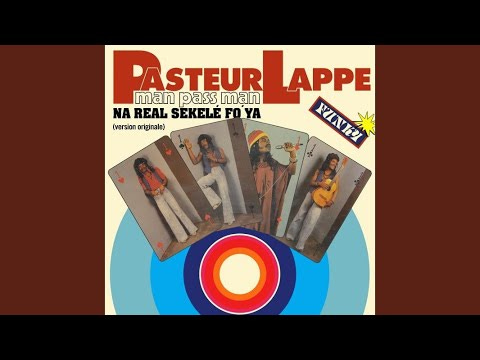From the Notebook: A Playlist
Retracing steps on the winding path that led to the criminally underappreciated Pasteur Lappe'
The search for joy in the form of unheard music is more about the random stumble than the straight line.
OK, sure, you might arrive at a record store with a single mission. But within minutes, you’re reading the credits on some record with an eye-catching cover, wondering what on earth this relic from a bygone age might sound like. That basic curiosity, shared by pro DJs and music sleuths, is really just human nature. It’s all you need to enter the glamorous, fast-paced world of crate-digging.
And you don’t even need a record store: Here on the lonely cacaphonious Internet, there are breadcrumbs leading to audio miracles around every corner. Case in point: Last week I wrote about the Cameroonian singer and songwriter Pasteur Lappe, who made three records of sparkling African dance music with the guitarist and producer Jacob Desvarieus of Kassav.
Here’s one of their tracks that I believe has instant mood-altering power:
That post was an accident. It’s not where I started. At all.
I was looking for a specific carnival song from Trinidad from the ‘60s. The YouTube search function failed me, but it brought me to a “You May Also Like…” record I used to own when I lived in Miami: The 1984 Kassav-adjacent record by Jacob Desvarieux and his co-leader, Georges Decimus. It’s glossy, with interestingly reverby drum sonics and prayerful vocals — traits that carry through many of the legendary Guadeloupe band’s studio works.
That got me curious about what happened to the early recordings of Kassav,’ the ones that came before the band erupted across the Caribbean in the mid ‘80s. The band’s first record, Love and Ka Dance, arrived in 1979 in France, and was brought out in the U.S. on Celluloid Records in 1980. It’s one of those genius records that transcends its time-stamp. After being missing for decades, it was reissued in 2019 and is available via Bandcamp here.
Kassav’ was profoundly adventurous during this period, cultivating a dialog between Guadeloupe’s carnival music and African dance music, disco and polished European pop. In addition to the chattering uptempo dance stuff the band pioneered as “zouk,” it was deeply conversant in the funk. Check the bone-rattling bassline of “Kakika” from the second Kassav’ effort, circa 1980:
Desvarieux told interviewers that “Banzawa” and other explorations from his eponymous solo record, issued in 1983, formed the conceptual foundation of zouk. If you know Kassav’s hits from the mid ‘80s, you’ll hear the connection instantly….
You get the sense that during the early ‘80s, the Kassav’ principals operated within a slightly insular bubble that allowed for different types of creativity — in addition to writing for the band, the musicians were involved in whirl of solo projects. The Digital Zandoli compilation documents some of the funk coming from those in the Kassav’ orbit; it includes this breezy track by Pierre Edouard Décimus and vocalist Patrick Saint-Eloi.
An exceedingly knowledgable reader rhapsodized via email over Desvarieux’ early works, noting that as both a guitarist and producer, he brought only what the track needed; both his rhythm playing and sly, almost subterranean solo excursions exude a kind of minimalist poise. Even on a lively (and sonically crowded, what with that over-active horn section) party track like this one from the third Kassav effort, it’s possible to follow Desvarieux’ clear architectural lines.
The Kassav discography is a jumble. There have been many reissues and repackagings of the same music, sometimes under different titles, and as per usual with YouTube, not everything posted is authorized. I’m conflicted about sharing those types of links, but until official versions are readily accessible, these grey-market ones at least illustrate the astonishing range of creativity that erupted in the brief period between the trio of Desvarieux/Lappe titles and Kassav’s 1985 “Zouk la sé sel medikamen nou ni (Zouk is only medicine we have),” one of the torrid early smash hits.
In interview with Caribbean Beat magazine, Desevarieux said this about the music he and his crew created: “Everything that makes people like rock in Europe — the social questioning, the high spirits — all the social aspects of rock can be found in zouk. But rock doesn’t make you dance till you fall to the ground; zouk, yes.”





